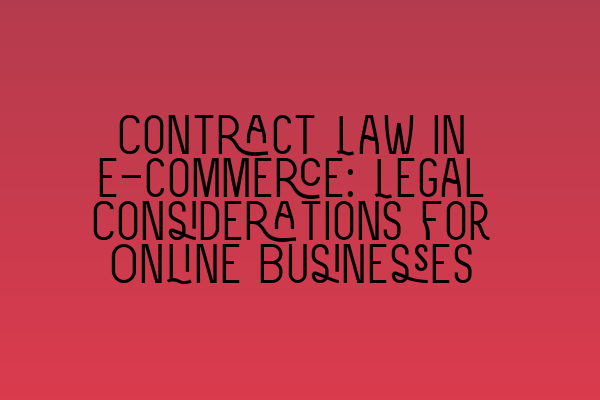Contract Law in E-commerce: Legal Considerations for Online Businesses
As the world of commerce continues to shift towards the digital realm, online businesses face unique legal challenges when it comes to contract law. The absence of face-to-face interactions and the global nature of e-commerce transactions require careful consideration of various legal aspects to protect the rights and interests of both businesses and consumers. In this article, we will explore some of the key legal considerations that online businesses must keep in mind to ensure compliance with contract law and create a secure and trustworthy environment for their customers.
The Importance of Effective Contract Formation
One of the fundamental principles of contract law is the formation of a valid and enforceable contract. In the online world, this can be achieved through the use of well-drafted terms and conditions or a click-through agreement. These contractual documents must clearly state the essential terms of the agreement, such as the products or services being offered, the price, payment terms, delivery details, and any applicable warranties or guarantees.
It is crucial for online businesses to ensure that their terms and conditions are easily accessible to customers. This can be done by providing a prominent link on the website’s homepage or during the checkout process. By doing so, businesses can mitigate the risk of disputes and potential legal challenges by ensuring that customers have the opportunity to review and accept the terms before making a purchase.
Consumer Protection Regulations
Online businesses must also be mindful of consumer protection regulations that govern e-commerce transactions. These regulations aim to provide consumers with certain rights and protections when purchasing goods or services online.
One such regulation is the Consumer Contracts Regulations, which grants consumers a cooling-off period during which they can cancel their order and receive a full refund. Businesses must clearly communicate this right to consumers and provide them with the necessary information on how to exercise it.
Additionally, businesses must comply with laws regarding the marketing and sale of goods or services online. This includes adhering to rules related to pricing transparency, accurate product descriptions, and fair advertising practices. Failure to comply with these regulations can result in financial penalties and reputational damage.
Privacy and Data Protection
As online businesses collect and process vast amounts of customer data, it is vital to prioritize privacy and data protection. The General Data Protection Regulation (GDPR) sets out strict rules for the collection, storage, and use of personal data within the European Union.
Online businesses must obtain clear and informed consent from customers before collecting their personal data. They must also ensure the security of this data through appropriate technical and organizational measures. Any data breaches must be promptly reported to the relevant authorities and affected individuals.
Dispute Resolution
In the event of a contract dispute, online businesses should consider the most appropriate method of dispute resolution. This may include negotiation, mediation, or, if necessary, litigation. It is often beneficial for businesses to include a dispute resolution clause in their terms and conditions, stipulating the preferred method of resolving disputes and the jurisdiction in which any legal proceedings would take place.
By proactively addressing potential disputes in advance, businesses can save valuable time, resources, and maintain positive customer relationships.
Conclusion
In the ever-evolving landscape of e-commerce, online businesses must navigate the complexities of contract law to ensure compliance and protect their interests. By focusing on effective contract formation, consumer protection regulations, privacy, and data protection, as well as dispute resolution mechanisms, businesses can create a secure and trustworthy environment for both themselves and their customers.
For more insights into legal practice and decision-making, take a look at our article on unveiling real-life case studies. To learn about the factors affecting solicitor salaries in the UK, check out our exploration of solicitor salaries. Additionally, if you are interested in enhancing your client relationship management skills as a solicitor, our article on mastering client relationship management provides valuable insights. Lastly, if you are considering a law school education in the UK, our article on pursuing a law school education and our roadmap to becoming a solicitor through securing training contracts will provide you with the information you need.
